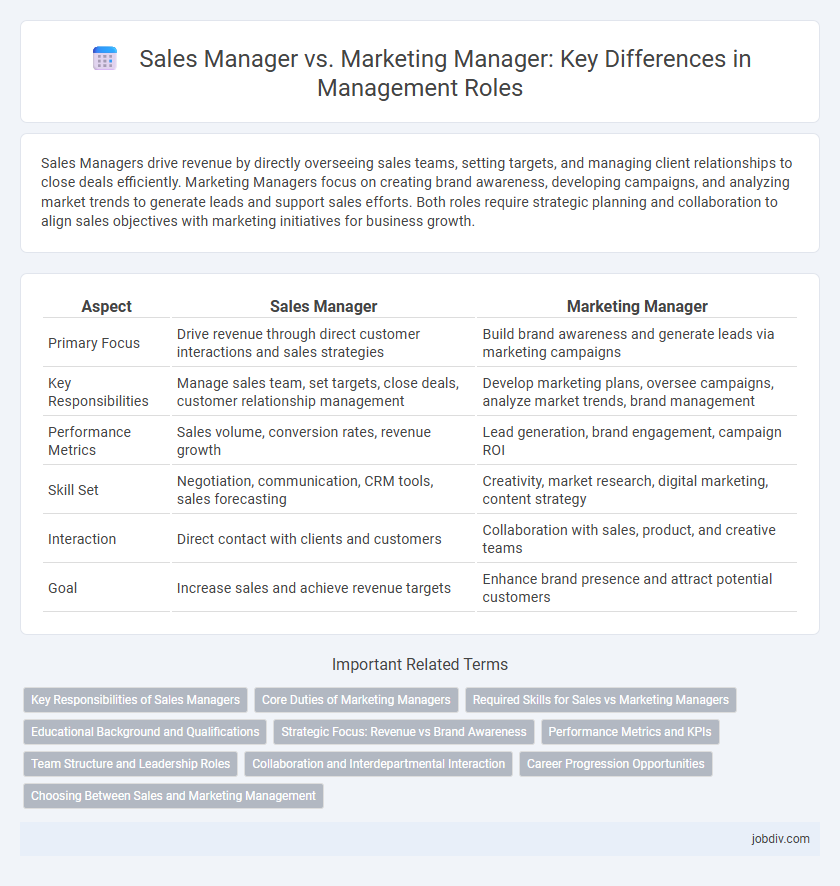Sales Managers drive revenue by directly overseeing sales teams, setting targets, and managing client relationships to close deals efficiently. Marketing Managers focus on creating brand awareness, developing campaigns, and analyzing market trends to generate leads and support sales efforts. Both roles require strategic planning and collaboration to align sales objectives with marketing initiatives for business growth.
Table of Comparison
| Aspect | Sales Manager | Marketing Manager |
|---|---|---|
| Primary Focus | Drive revenue through direct customer interactions and sales strategies | Build brand awareness and generate leads via marketing campaigns |
| Key Responsibilities | Manage sales team, set targets, close deals, customer relationship management | Develop marketing plans, oversee campaigns, analyze market trends, brand management |
| Performance Metrics | Sales volume, conversion rates, revenue growth | Lead generation, brand engagement, campaign ROI |
| Skill Set | Negotiation, communication, CRM tools, sales forecasting | Creativity, market research, digital marketing, content strategy |
| Interaction | Direct contact with clients and customers | Collaboration with sales, product, and creative teams |
| Goal | Increase sales and achieve revenue targets | Enhance brand presence and attract potential customers |
Key Responsibilities of Sales Managers
Sales Managers are responsible for developing sales strategies, managing sales teams, and achieving revenue targets. They analyze sales data to identify trends, forecast sales performance, and optimize sales processes. Their core duties include client relationship management, negotiating contracts, and driving business growth through effective team leadership.
Core Duties of Marketing Managers
Marketing managers develop and implement strategies to promote products and services, focusing on market research, brand management, and customer engagement. They analyze consumer behavior and competitive trends to create targeted campaigns that drive demand and enhance brand visibility. Their core duties include coordinating advertising efforts, managing digital marketing initiatives, and measuring campaign performance to optimize ROI.
Required Skills for Sales vs Marketing Managers
Sales Managers require strong negotiation abilities, customer relationship management, and proficiency in sales forecasting to drive revenue growth and team performance. Marketing Managers need expertise in market research, digital marketing strategies, and brand management to effectively promote products and capture target audiences. Both roles demand leadership, communication skills, and analytical thinking, but Sales Managers emphasize direct customer interaction while Marketing Managers focus on strategic campaign development.
Educational Background and Qualifications
Sales Managers typically hold degrees in business administration, marketing, or related fields, often complemented by certifications in sales techniques or CRM software. Marketing Managers usually have educational backgrounds in marketing, communications, or digital media, with qualifications emphasizing market research, brand management, and data analytics. Both roles benefit from continuous professional development through workshops and industry-specific training to stay current with evolving market trends.
Strategic Focus: Revenue vs Brand Awareness
Sales Managers concentrate on driving revenue growth by developing and implementing sales strategies, managing customer relationships, and optimizing sales team performance to meet targets. Marketing Managers focus on enhancing brand awareness through targeted campaigns, market research, and positioning to build long-term customer loyalty and market presence. The sales role prioritizes immediate financial results, while marketing emphasizes strategic brand development to support sustainable business growth.
Performance Metrics and KPIs
Sales Managers primarily focus on performance metrics such as sales revenue, conversion rates, average deal size, and quota attainment to measure effectiveness. Marketing Managers emphasize KPIs including lead generation, cost per acquisition (CPA), marketing qualified leads (MQLs), and return on marketing investment (ROMI) to evaluate campaign success. Aligning these metrics ensures synchronized efforts between sales and marketing functions, driving overall business growth.
Team Structure and Leadership Roles
Sales Managers lead teams focused on achieving revenue targets through direct customer engagement and closing deals, often managing sales representatives and account managers. Marketing Managers oversee teams responsible for market research, campaign execution, and brand strategy, typically guiding specialists in digital marketing, content creation, and product promotion. Both roles require strong leadership skills but differ in objectives: Sales Managers drive short-term sales performance while Marketing Managers build long-term brand presence and demand generation.
Collaboration and Interdepartmental Interaction
Sales Managers and Marketing Managers collaborate closely to align strategies that drive revenue growth and brand awareness. Effective interdepartmental interaction involves sharing customer insights and campaign data to optimize lead generation and conversion rates. This synergy fosters unified messaging, enhances customer experience, and accelerates the sales funnel efficiency.
Career Progression Opportunities
Sales Managers often advance through roles such as Regional Sales Director or Vice President of Sales, leveraging their expertise in client relationships and revenue growth. Marketing Managers typically progress to positions like Brand Director or Chief Marketing Officer, emphasizing strategic planning and market analysis skills. Both paths offer leadership opportunities, but Sales Managers focus on direct revenue impact while Marketing Managers drive long-term brand development.
Choosing Between Sales and Marketing Management
Selecting between a Sales Manager and a Marketing Manager role depends on organizational goals and skill sets, where Sales Managers drive revenue through direct customer engagement and negotiation, while Marketing Managers focus on brand positioning, market research, and lead generation strategies. Sales management emphasizes short-term sales targets and relationship management, whereas marketing management prioritizes long-term brand development and customer outreach through diverse channels. Effective leadership in either role requires aligning team objectives with business growth, leveraging analytics, and understanding customer behavior for optimized performance.
Sales Manager vs Marketing Manager Infographic

 jobdiv.com
jobdiv.com